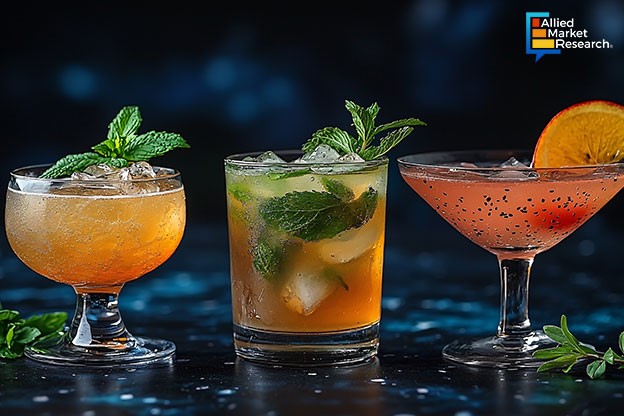Non-Alcoholic Spirits: Exploring the Surge in Innovative Production Techniques

9 Jan
2025
Highlights:
- Introduction
- Health benefits of alcohol-free beverages
- Advancements in manufacturing techniques
In the post-globalization era, the increasing disposable incomes of people in developed and developing countries have led to huge changes in their lifestyles and dietary habits. For instance, the demand for packaged and on-the-go foods and beverages has grown due to the busy daily routines of people in urban areas and metropolitan cities. Additionally, in the last few years, especially after the COVID-19 pandemic, the awareness regarding the importance of immunity has surged exponentially. This has driven demand for beverages and food products that promote better health and well-being. The trends related to veganism and plant-based items have further revolutionized the food and beverages domain.
One such trend witnessed in the food and beverages sector is the growth in the consumption of non-alcoholic spirits. As the name suggests, these drinks are just distilled liquid refreshments that do not contain any alcohol, sugar, and/or calories. These products are mainly developed for customers who want the mouthfeel, warmth, and flavor of traditional spirits without having to consume any alcoholic content. As a wide range of liquors are available in the market, beverage companies have developed different types of non-alcoholic spirits which serve as alternatives to whiskey, rum, gin, vodka, tequila, etc.
Increasing consumption of non-alcoholic spirits impacting the industry positively
The non-alcoholic spirits industry accounted for $325.8 million in 2023 and is predicted to amass a sum of $706.7 million by 2033, rising at a CAGR of 8.1% during 2024-2033. The increasing demand for alcohol-free beverages among millennials and the Gen-Z population has created numerous growth opportunities for the industry. At the same time, many people across the globe are taking the decision to lead a ‘sober-curious’ lifestyle. ‘Sober-curious’ refers to cutting back the consumption of alcohol for a more healthy and holistic way of living.
Along with this, the demand for non-alcoholic spirits has increased due to certain health benefits offered by these beverages. Most of these alcohol-free drinks contain citric juices or additives that are rich in antioxidants. Regular consumption of these products helps in faster burning of body fat, thereby aiding in weight loss proactively. Moreover, since these beverages do not contain any added sugar or calories, they assist in regulating blood sugar and body glucose levels efficiently. Moreover, herbal ingredients added to these beverages improve brain functioning and reduce the overall stress and pressure on the central nervous system. This ultimately improves the sleep of the individual, thus aiding in treating circadian rhythm disorders.
Advanced manufacturing and distillation processes increasing the revenue share of the industry
One major problem regarding traditional distillation processes is their inability to remove the entire alcohol content within a beverage. In some cases, these techniques even strip off the flavor of the spirit, thus affecting its mouthfeel. To deal with this problem, advanced reverse distillation processes have been developed that aid in removing alcohol without impacting the flavor in any manner. At the same time, innovative manufacturing methods such as supercritical CO₂ extraction help non-alcoholic spirit companies to add esters and flavors to improve the overall aromatic and olfactory experience. Techniques such as molecular gastronomy enable manufacturers to change the chemical composition of ingredients so as to enhance the taste and texture of the beverage without the addition of any alcoholic content.
Along with technological advancements, strategic alliances with peers in the market have helped many leading businesses to expand their footprint in the industry. For instance, in September 2024, Diageo, a premium drinks manufacturer, announced the acquisition of Ritual Zero Proof Non-Alcoholic Spirits (Ritual), a leading player in the non-alcoholic spirit industry. Over the years, Ritual has expanded its customer base across the US and has become the number one brand in the alcohol-free beverages sector. The business move by Diageo is, thus, expected to strengthen its position in the landscape.
Winding up, the non-alcoholic spirits market is predicted to make significant gains in the coming period due to the increased awareness regarding the importance of healthy diets and lifestyle habits. In addition, the growing adoption of innovative manufacturing techniques such as reverse distillation and molecular gastronomy has accelerated the industry’s growth and success.
Get in touch with our experts for the growth drivers and investment opportunities across the landscape!

Akhilesh Prabhugaonkar
Author's Bio- Akhilesh Prabhugaonkar holds a bachelor’s degree in Electronics Engineering from the reputed Vishwakarma Institute of Technology. He has a special interest in the fields of forensics, world history, international relations and foreign policy, sports, agriculture, astronomy, security, and oceanography. An ardent bibliophile and melophile, Akhilesh loves to write on topics of his interest and various other societal issues. This love for writing made him enter the professional world of content writing and pursue his career in this direction.
Avenue: Entire Library membership of Allied Market Research Reports at your disposal
- Avenue is an innovative subscription-based online report database.
- Avail an online access to the entire library of syndicated reports on more than 2,000 niche industries and company profiles on more than 12,000 firms across 11 domains.
- A cost-effective model tailored for entrepreneurs, investors, and students & researchers at universities.
- Request customizations, suggest new reports, and avail analyst support as per your requirements.
- Get an access to the library of reports at any time from any device and anywhere.
Related Post
-
How are Submarine Cables Transforming Global Connectivity with Enhanced User Experience?
-
Endoscopy Procedures: Transformations in Techniques and Applications
-
AI-Powered Video Analytics: How the Product Actually Works for enterprises
-
Painting Robots: Transforming Precision Coating and Creative Applications
-
Innovations in Pharmacovigilance Systems Advancing Patient Safety
-
Understanding Edge Security: Keeping Data Safe Near the Source
-
Exploring the Use and Advancements of 3D Laser Scanners in Professional Applications
-
Reinforcing Industrial Controls with Smarter Tools and Training








